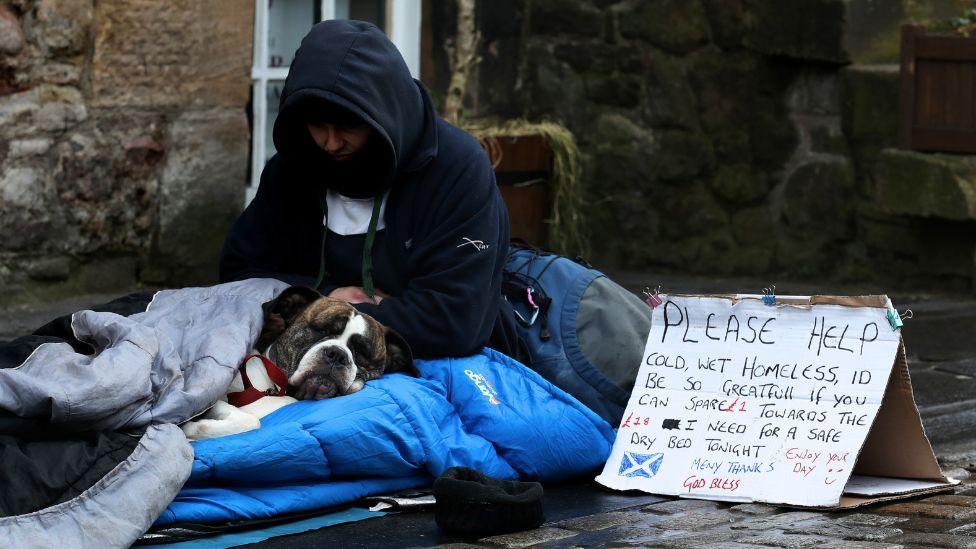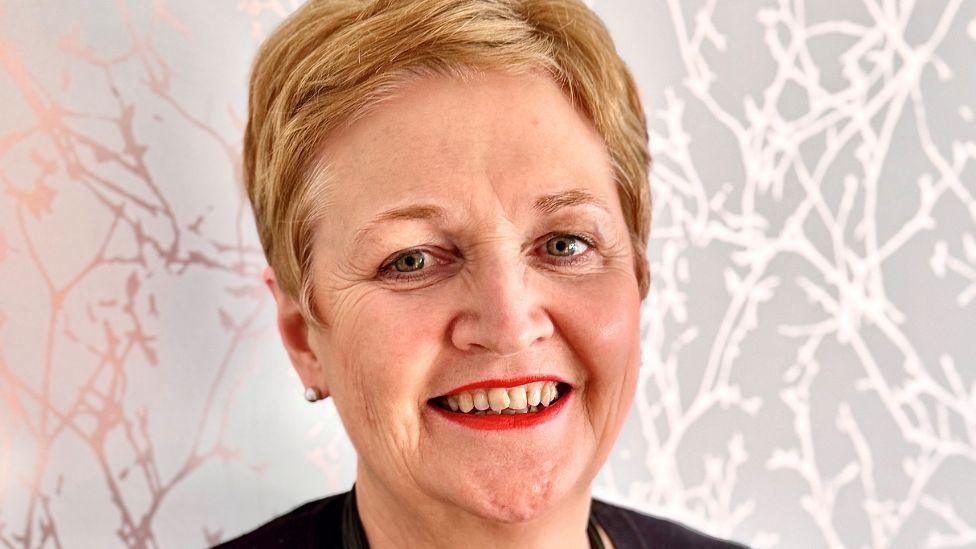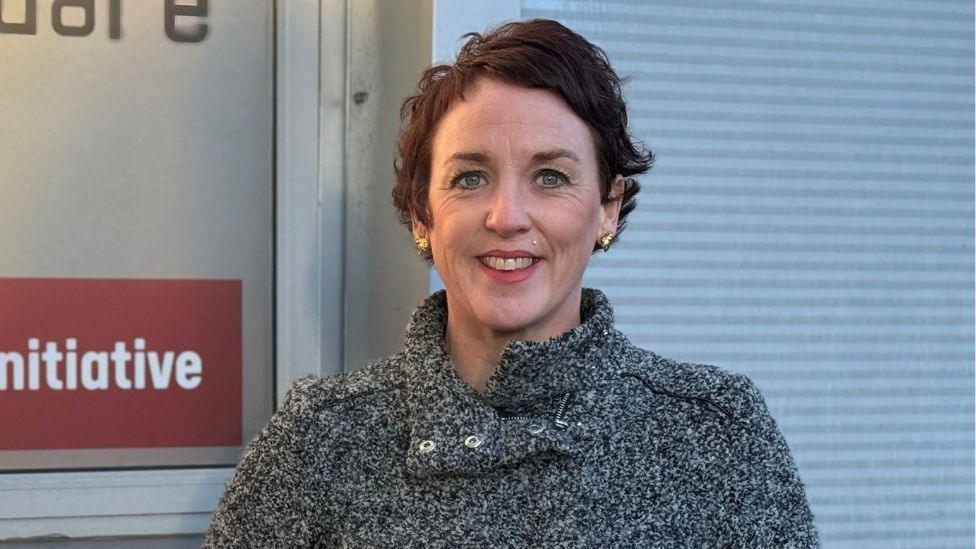Charities facing tax hike have 'nowhere to cut'

A homeless charity in Edinburgh says it may have to cut staff
- Published
Charities are calling for urgent support from both the UK and Scottish governments to prevent services from collapsing.
Hospices, homelessness organisations, social care providers and animal shelters have told BBC Scotland News that their operations are being jeopardised by UK government plans to increase employers' National Insurance.
They say they have "nowhere left to cut" and warn they could be forced to cut jobs or take measures like turning sick patients away from hospices.
The UK Treasury says its tax regime for charities is "among the most generous of anywhere in the world", while the Scottish government says the UK policy "risks hampering economic growth and damaging public services".
Chancellor Rachel Reeves announced in her Budget that the rate of employer National Insurance (NI) contributions will increase from 13.8% to 15%.
She is also lowering the threshold at which employers have to start paying NI contributions from £9,100 to £5,000.
However, the employment allowance - which allows companies to reduce their NI liability - will increase from £5,000 to £10,500.
Swinney urges UK to cover NI hike for charities
- Published7 November 2024
When is the Scottish Budget and what will be in it?
- Published4 December 2024
The Scottish government is being at least partly compensated by the Treasury for increased public sector staff costs.
But charities - which are often hired by the government and councils to deliver public services - have received no such guarantees.
The Scottish Council for Voluntary Organisations estimates the tax hike, which is due to take effect in April, could cost the sector about £75m.
It told BBC Scotland News the NI change "may be the straw that breaks the camel’s back".
Prince and Princess of Wales Hospice says the tax hike, combined with efforts to keep pace with NHS Scotland pay rises, would double its deficit to £1m - and warns that dying people and their families could suffer as a result.
It receives about 1,200 new patient referrals every year, and gets about a third of its funding from the local NHS board. The rest comes from fundraising, but that is becoming increasingly difficult due to cost-of-living pressures.
“The last thing that we want to do is to cut patient services or jobs," said CEO Rhona Baillie.
"It would be an absolute last resort, but we have absolutely made every other efficiency that we can and we have nowhere else to go.”

Another “last resort” could be, for the first time ever, turning patients away.
The heads of all 14 Scottish hospice charities recently warned in a letter to the Herald, external that the measure was being considered.
“That would be the absolute worst thing for us. It's something we don't want to do," said Ms Baillie.
"It’s our belief that everybody should have a good death - die peacefully, die with dignity."
As with all the charities BBC Scotland News spoke to, hospices say these financial issues can be traced back well beyond the NI hike, citing years of under-funding from Holyrood.
But with just months to plan, the tax change has come as a brutal shock.
'Death knell' for social care
Turning Point Scotland is a social care provider supporting between 8,000 and 12,000 people at any one time, with a staff of about 1,200 people.
It works primarily with disabled people, but also offers drug and alcohol services and support for homeless people.
Turning Point Scotland is commissioned to deliver public services on behalf of local authorities and the Scottish government.
The charity estimates that the NI hike will cost it £1.1m per year.
“It’s been described as the straw that breaks the camel’s back," said chief executive Neil Richardson.
"It is the death knell for Scottish social care."
Several of Turning Point's services were already in deficit - meaning they do not get enough funding to cover the costs of providing the service. Mr Richardson said they will all go into deficit in April.
Without significant changes in funding, he says they will be forced to consider cutting staff, reducing pay and scrapping services.

Turning Point Scotland chief executive Neil Richardson says cuts would have an emotional toll for service users
While the not-for-profit charity does not have to answer to shareholders, it cannot operate at a loss.
"If we are delivering ongoing deficits we will obviously, basic economics would say, go out of business. It’s just a matter of how long that takes," he said.
Service cuts would have an emotional toll too. “Some of the people we support we have supported for decades, and there’s a caring bond that has been built," he added.
He called the chancellor's tax plans “self-defeating" - and called for help from the Scottish government in its upcoming Budget.
“If this was a move to raise revenue, if it forces organisations like ours out of business the revenue dries up anyway," Mr Richardson said.
"It makes no economic sense and yet the Treasury appear to be holding firm on it.”
'Nowhere left to cut'
Four Square Scotland supports people facing homelessness in Edinburgh on behalf of the local authority. It provides accommodation, has a social enterprise selling second hand furniture and runs a women's refuge.
The charity employs about 120 people with a turnover of less than £4m.
It says the tax hike will increase its staff costs by £67,000 - roughly equivalent to two posts in its central support team.
“There is nowhere left to cut," said chief executive Jane Devine, who warned that the charity may have no choice but to reduce the number of non-frontline workers.
"We’re not in the position where if somebody goes off sick or somebody leaves it’s not a problem. It really is a problem.
"So having to get rid of those posts is even worse.”
Ms Devine said there is a “paradox” in the UK government’s approach - ministers want to invest more in public services, such as support for homeless people, but in its efforts to fund such efforts they are taking money away from charities that provide those services.

Jane Devine runs Four Square Scotland, a homelessness charity in Edinburgh
The Scottish Council for Voluntary Organisations has called on the UK government to abandon the NI increase. Failing that, it says the Scottish government should fully fund the additional costs for charities in receipt of public funding.
First Minister John Swinney has urged the Treasury to cover the costs.
His government will set out what financial support it aims to provide to charities in its Budget, to be announced on Wednesday.
Finance Secretary Shona Robison: “This UK government policy risks hampering economic growth and damaging public services and whilst discussions with the Treasury are ongoing, we still do not have certainty ahead of the Scottish Budget.”
In response to an appeal from the National Council for Voluntary Organisations, Chancellor Rachel Reeves said, external she recognised the "important role" of charities, but stopped short of offering compensation for the tax hike.
She says the measure will raise £25bn and means direct taxes on workers can be avoided.
The Treasury has said its tax regime for charities is "among the most generous of anywhere in the world", with the autumn Budget delivering just over £6bn of tax relief for organisations and donors this financial year.
A spokesperson said the increased employment allowance will protect charities, meaning more than half of them with NI liabilities "either gain or see no change next year".